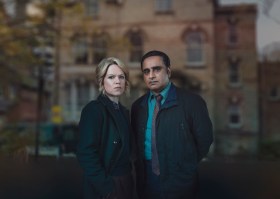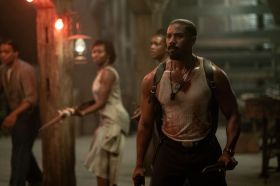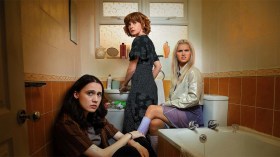Some might suggest, rather uncharitably, that the last thing Baz Luhrmann’s groaning-at-the-seams 2008 outback epic Australia needs to be is longer. But by – one of the film’s many eyebrow-raising utterances of – ‘crikey’, that’s exactly what the oft-OTT auteur’s re-edited, now six-part Disney+ miniseries Faraway Downs does.
Finding himself at a loose end, with lockdowns sideswiping his shooting schedule on Elvis, Herons Creek-raised local hero Luhrmann turned his attentions to resuscitating the Nicole Kidman and Hugh Jackman-starring WWII drama’s reputation, after a frosty critical reception and modest box office-to-budget ratio back in the day.
Feeling that he’d lost sight of the true heart of the film – Brandon Walters’ First Nations lad Nullah, at risk of becoming one of the Stolen Generations – the filmmaker used the enforced downtime to revisit the record-breaking two million-plus feet of film shot on location in the Northern Territory and WA.
As captured with a grand sweep by DOP Mandy Walker, the outback adventure still looks lush, with many thanks due to Catherine Martin’s suspiciously dirt-free, Oscar-nominated costumes. But does the episodic recut, now bearing the name of the vast cattle station owned by Kidman’s English Lady Sarah Ashley, actually work?
Once more with feeling
Despite the aforementioned proliferation of ‘crikeys’, most egregiously uttered by a goggle-sporting Kidman as she haughtily arrives in Darwin and is transported to Faraway Downs by Jackman’s pub-scrapping and apparently nameless ‘Drover’, the space allowed does, indeed, let the story breathe.
Breaking Faraway Downs into mostly half-hour-ish chapters – each with a Mills & Boon-like title along the lines of Secrets, Betrayal and Romance – tames some of Luhrmann’s enduring propensity to go too big, too often, giving us more palatable bites of his oft-admirable extravagance.
The greater role for a remarkable young Walters is a generous gift that uplifts the whole. It’s also good to see the additions bolster, to a lesser extent, the other Aboriginal actors, including the magnificent Ursula Yovich as his fretful mother, Daisy and the late, irreplaceably great David Gulpilil as his grandfather, King George.
While the latter’s role may lean quite heavily on the local equivalent of the ‘magical negro’ trope, there’s no denying the mesmeric quality of his magnetic screen presence. The idea of him granting the young boy the gift of traditional song is still touching. There’s an electric hum-like promise of rain hanging in the air to how Nullah, descending from a water tower that will play a fateful role in his story, uses that gift to sing Sarah to him.
Read: Catherine Martin: ‘You need a bit of conflict and tension’
Initiating a bond of prescient found family that will aid him greatly when tragedy strikes, Kidman and Walters are dynamite together. As Sarah cradles Nullah, he beckons her to tell him a story as she relays fragments of L. Frank Baum’s The Wonderful Wizard of Oz, trilling snippets of the Judy Garland-performed ‘Somewhere Over the Rainbow.’ His mapping this tall tale to his understanding of the Rainbow Serpent is the film’s most sublime stroke.
But their emerging union also instigates a terrible threat in the slithering shape of David Wenham’s magnificently malevolent station boss, Fletcher. Leaping on the mysterious off-camera murder of Sarah’s no-good husband with a glass-tipped spear, he initiates a vicious land grab on behalf of Bryan Brown’s still oddly under-utilised magnate, King Carney.
As an army captain tasked with negotiating these competing tenders to buy beef for the Allies, Ben Mendelsohn unsurprisingly makes the most of a leaner role.
When Sarah shows her mettle, throwing Fletcher off her manor, the series’ first overarching arc forces her and the Drover to ride side-by-side with their motley crew to drive her cattle to Darwin and head off Carney’s game. While the CGI stampede and literal cliffhanger still look less than convincing, Walters again sells the drama, and it lands better this time round.
No end without war
A story of stops and starts, episode four’s focus on the fires fanned between Sarah and the Drover, with Kidman and a rippling Jackman, winking at the camera’s lascivious gaze, have genuine chemistry despite the comically heavy-handed nature of their opposites attract dance.
Read: Luhrmann’s Australia ‘holds the Kodak record’ for most footage captured on film
Bringing the film to another of its faux conclusions, a scandalous foxtrot at a hoity-toity Darwin ball – ‘Let’s really give the bastards something to talk about’ – left me momentarily wondering what was left?
How could I forget about the war?
The bombing by the Japanese air force is an astoundingly cinematic cataclysm that pitches the story into an apocalypse now that’s thrillingly gripping. Scattering the characters amongst the fiery rubble raises the stakes, suddenly much more keenly felt. It’s here that Luhrmann’s extravagant filmmaking style comes into its own, with the drama underlining the stark differences over which lives are most valued. A heart-stopping alternate finale filmed but abandoned drives home a gut-punch with a scene-stealing thrust by Gulpilil.
Bolstered by new music from dance music duo Electric Fields and singer-songwriter Budjerah, Faraway Downs might not fix all of Australia’s daggiest missteps, but in the wake of the failed Voice referendum, its bittersweet mythologising does carry more weight.
And by crikey, I like it.
Faraway Downs premieres on Disney+ on 26 November.





